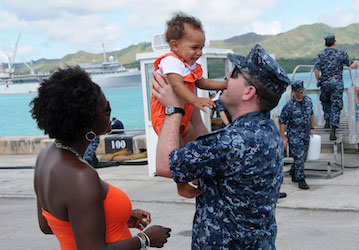Too often, you hear about the challenges Military Service Members encounter: long deployments, family separations, frequent moves, the increased risks for injury or death, and more. It’s true, military families face unique challenges that civilian families often don’t. But military service also exposes families to values, cultures, and unique opportunities and experiences that can optimize performance across multiple areas of life. Consider the strengths you already have—and the many additional resources available to you as a member of a military family—through the holistic Total Force Fitness (TFF) approach to being your best.
Total Force Fitness for families
The strengths of Military Service Members and their families span the domains of Total Force Fitness. TFF is about paying attention to your health as a whole and demonstrating physical, mental, social, and spiritual strengths. The TFF paradigm considers family health and strong relationships a key component of Warfighter optimization. Achieving TFF is possible when military families prepare for the challenges ahead and access the many resources available.
Family fitness
Family is the backbone of support for many Military Service Members, and DoD recognizes that an optimized family equals an optimized Warfighter.
One of the top stresses military families must cope with is moving—and the related fallout of changing jobs and/or schools, and managing friendships from afar. The need to rebuild a support network can feel overwhelming. However, the PCS experience also offers a chance for personal growth. Military kids can really hone their social skills by learning how to meet new people and make new friends. In fact, compared with civilian children, kids from military families are more responsible and more open to diversity.
The military has a variety of resources to help families adjust to some of its more common challenges.
- Military Kids Connect is a message board for kids ages 6–17, by other military kids, that offers coping tips and info on various aspects of military life.
- The Military Spouse Employment Partnership includes more than 360 organizations ready to hire military spouses.
- If a job with the federal government is an option in your new PCS location, as a military spouse, you might be eligible for select, noncompetitive jobs through USAJOBS.gov.
By leveraging available military resources, you’ll likely find that many of the changes associated with being in the military can go more smoothly and make your family stronger
Mental fitness strengths
Military culture teaches core values (a key trait of optimized families) such as sacrifice, honor, and teamwork. Military Service Members and their families are also experts in adapting and learning about new places, people, cultures, and beliefs. Still, the military recognizes that demanding schedules, deployments, and other pressures can bring on more anxiety than sometimes feels manageable. Each branch offers resources to help you manage stress and build optimism and mental agility.
- The Air Force’s Comprehensive Airman Fitness
- The Army’s Ready and Resilient program
- The Coast Guard’s Health Promotion Resources
- The Navy and Marine Corps Public Health Center: Health Promotion and Wellness
Physical fitness strengths
The military’s strong emphasis on physical fitness can bring out the competitive spirit that you might not have otherwise tapped. Increased activity helps to improve fitness, but it also can mean building self-esteem along with your better body and health. The need to be active also creates an opportunity to build camaraderie with friends and family through exercise and play. You can foster that same drive to achieve fitness goals in your children too, helping them stay fit and strong. For more ideas on ways to stay active, stop into your local USO, to find out about upcoming fitness and wellness activities.
Most military bases have a gym, offer fitness classes, or have intramural sports teams that teens and adult family members can use, making a costly gym membership unnecessary. This makes it easier to support and motivate each other’s fitness goals¾whether it’s helping your Warfighter max the annual fitness test, participating in one of the many military race events, or just trying to stay in shape. These physical standards, competitive spirit, and access to MWR facilities all combine to create an environment that fosters strong family bonds.
For more resources within your service, check out:
- Army Components of Fitness
- Navy Fitness Program
- Air Force Fitness Program
- Marine Corps Physical Fitness
- Coast Guard Physical Fitness Program
Nutritional fitness strengths
Nutritional fitness isn’t just an essential component of passing the Physical Fitness Test, it’s also part of staying healthy as a military family. The military's focus on mission readiness spurs many Military Service Members to up their nutrition game, and that means knowing how to help your Warfighter and family fuel for optimal performance.
- The Department of Defense has many initiatives and resources to help families choose healthy foods.
- HPRC offers recipes, meal planning strategies, and tips for eating out to guide you in reaching your nutritional best.
- Go For Green® provides a quick and easy way to make high-performance choices in the dining facilities and also can be applied when cooking at home or eating out together.
- OPSS.org can help you make smart choices when choosing dietary supplements.
Bottom line
The challenges of military life provide great opportunities to expand your Total Force Fitness strengths and values. Take advantage of the many supports and resources in place to help optimize your family.





